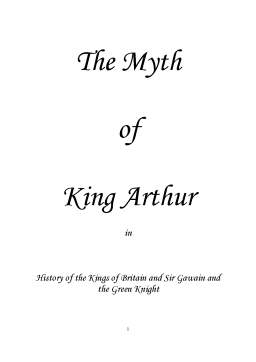Extras din referat
Seminar: King Arthur and His World in Late 20th Century Media
“When Arthur reached a field of battle bright
With pitched pavilions of his foe, the world
Was all so clear about him that he saw
The smallest rock far on the faintest hill,
And even in high day the morning star.”
Tennyson, The Coming of Arthur
From the very beginnings of the English literature there have been legends of great heroes and powerful kings. From the first settlements of Britain come stories that have as central figure the strongest, the bravest and the best hero of all times. King Arthur could be considered one such hero, known perhaps over all other mythical medieval figures as a powerful warrior, a chivalrous knight and an intelligent leader. Sometimes referred to as Arthur Pendragon, King Arthur stands as one of the greatest mythical heroes that perhaps the world ever knew. Arthur’s influence was so great, that stories of the high king traveled far beyond the realm of Britain into France, the rest of Europe, the Middle East, and even into parts of Asia. Richard Barber sustains Arthur’s influence in his work, King Arthur: Hero and Legend, by saying that “from the 12th century to the 21st, his exploits have been celebrated in prose and verse, and have inspired painters as well as poets.” Yet, the first questions that most people interested in King Arthur ask are: “Did Arthur really exist?” or “Who was he?” Therefore, in order to understand why he became such a towering figure in literature, we obviously must know something about him and his place in history. Again, we may ask what is that made the British people remember him for six hundred years after his time, and why an historian then “exalted his name until he rivaled Charlemagne in splendour and realms.” The answer to such dramatic questions are “matters of doubt and confusion” , for the period when Arthur lived is the most obscure in history.
Although, there is little evidence, either written or archeological, concerning Arthur’s time, in 12th century appeared the first manifestations of Arthurian legend. These manifestations can be described as literary works, though they also include elements of historical writings. The text which has long been regarded as “the springboard for all Arthurian literature” is the Historia Regnum Briatnniae, “History of the Kings of Britain”. This ‘history’ was written in Latin by the Welsh Geoffrey of Monmouth and dates from 1132. It represents the first literary account of King Arthur, and directly influenced Sir Gawain and the Green Knight. Geoffrey’s work was translated into French by the Anglo-Norman Robert Wace in his Roman du Brut in about 1155. This French version had most influence on the continental writers and was to lead to a crystallization of the various epic traditions taking Arthur as their central character. Geoffrey’s Historia provides the entire historical part of the story of Arthur, and being the first account of Arthur, the book was taken as truth, because it presented the history of Britain.
King Arthur is perceived as the savior of Britain, the man who brought peace and order to the troubled world, ensuring equality for all. Geoffrey paints a very different picture of the great king; he is a conqueror rather that a beacon of peace, whose brutal tactics brought years of war to Europe.
“The fact that he [Arthur] was dreaded by all encouraged him to conceive the idea of
conquering the whole of Europe… Once they were sure of victory, they invested the cities of
Norway and set fire to them everywhere. They scattered the rural population and continued to
give full license to the savagery until they had forced all Norway and Denmark, too, to accept
Arthur’s rule… Arthur then sailed off to Gaul. He drew his troops up in companies and began to
lay waste the countryside in all directions.” (Geoffrey 222-223)
Arthur’s aim was to dominate all of Europe, destroying all those in his path, leaving no consideration for the existence of the peasants and commoners, whose lives he was obliterating. The name, Arthur, itself can be a view into the man’s actions as a scholar notes, “…most scholars derive the name ‘Arthur’ from Arth, the British word of a bear. Hisoria Brittonum’s version gives a possible translation of ‘Arthur’ as ursus horribilis – ‘horrible bear’” (Gidlow 94).
Geoffrey’s King Arthur is one bent on spreading and enforcing his own power and prowess in battle. Thus, this information forces one to re-evaluate the definition of Arthur as a peaceful king, with only the end of war in mind. The idea of Arthur as a warring king reinforces the notion of Arthur creating a British empire, creating an inevitable conflict with Rome.
Arthur’s tactics during battle and his desire to enlarge his kingdom reveal his insensibility towards Europe’s people. Being confident in his own forces and that other nations feared him, Arthur continued invading Europe and the provocation of the empire is nearly endless during his siege of Roman territory in Gaul. Therefore, we can notice that Geoffrey establishes King Arthur as a man who is restless in time of peace, a man who wants to enlarge Briton into an international empire by all means. Such negative attributes characterizes Arthur’s figure in the History of the Kings of Britain. Not only the brutality and the war hunger of King Arthur are made clear in Geoffrey’s work, but also the hypocrisy of Arthur’s actions and his court. All this characteristics are in strong contrast to the general perception of the moral and egalitarian Arthur, who would place truth and the chivalric code as the main features of one’s characters. When he has the opportunity of war with Rome, it is Arthur who pleads the unreasonable case given his activities throughout Europe.
Preview document
Conținut arhivă zip
- The Myth of King Arthur.doc


















